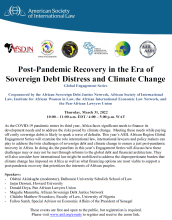Africa is by far the continent with the lowest carbon emissions, accounting for between 2% to 3% of global CO2 emissions (with South Africa accounting for about 33% of all CO2 emissions in Sub-Sahara Africa). However, with the prospects of increased intra-Africa trade as a consequence of the ambitions of African states under the African Continental Free Trade Area ("AfCFTA") it is inevitable for CO2 emissions to increase with the expanded use of fossil fuels (petroleum products, gas and coal) in prospective industries[1] who intend to tap into the opportunities that the AfCFTA presents. In addition, the prospects of increased trade between Africa states and other strategic trading partners such as the United States, the European Union and China will also contribute to Africa's pie of CO2 emission to increase gradually overtime. As for the rest of the world, the commitment to decarbonization the global economy has become even much strong pursuant to the release of report titled 'Climate Change 2021: The Physical Science Basis' dated August 2021 by the Intergovernmental Committee on Climate Change ("ICCC Report"). The ICCC Report has set-off the alarm bells that it may already be too late to meet the CO2 emissions target and has re-emphasized the need for accelerated investment in clean energy technologies and has now largely solidified the significant role green hydrogen can play as part of the energy transition from fossil fuels (petroleum products etc) to meet the global target of reducing CO2 emissions to about 1.5 degrees Celsius.
